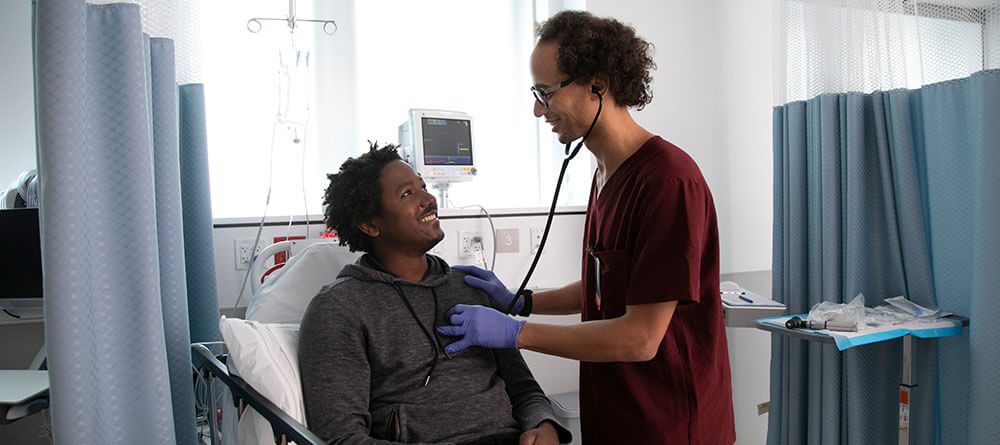Now that you’re completing—or are about to begin—your medical school journey, it’s time to start planning your strategy for obtaining a postgraduate position. You’re probably wondering how to be a competitive residency applicant. The good news is landing the residency you want may be less of a mystery than you might think.
So what do residency programs look for, exactly? Keep reading to discover how you can make yourself stand out.
What are residency programs looking for? 7 factors to focus on
Matching for residency is all about demonstrating that you’re a strong candidate who will work well with the physicians at your desired program. The specific criteria program directors seek will vary among institutions, but residencies typically look for the following in a candidate.
1. Strong USMLE Scores
The United States Medical Licensing Examination (USMLE) is a three-step test all US physicians must pass to obtain licensure. By the time you’re ready for medical residency, you will have completed both the USMLE Step 1 and the USMLE Step 2 CK. You can be certain residency programs will be looking for these scores as part of their evaluation process.
Dr. Inna Husain, assistant residency program director for simulation education at Rush University Medical Center, explains why. “Scores and grades can be incredibly important in this initial stage since all the reviewer has to compare files is objective data,” she says. “Some programs even have a cutoff for scores.”
But if you don’t perform as well as you hope on these exams, that doesn’t necessarily rule you out as a potential resident. It all depends on what your results say about you as a person, according to Dr. Amber Billet, St. George’s University (SGU) graduate and program director at the WellSpan York Hospital Emergency Medicine Residency Program.
For example, Dr. Billet highlights an example of a medical student who doesn’t earn a passing score on their first Step 1 attempt. “If their performance increases significantly on Step 2, then we always want to know, ‘Ok, how did you make such significant improvement?’” she explains. In many cases, Dr. Billet notes that improvement can be indicative of a candidate demonstrating some important intangible characteristics like self-reflection and motivation.

2. Solid grades
Good grades often go hand-in-hand with strong test scores. And while your medical school GPA is just one part of the equation, it’s helpful to remember that lifelong learning through continuing education requirements is an inherent part of being a doctor. As such, it’s in your best interest to show you can be successful as a student.
You’ll be expected to learn a lot of material during your postgraduate training, and residency programs are looking for an indication that you’ll be able to handle the rigorous training. “Residency is a job,” Dr. Billet says. “At the same time, you’re still a learner. In residency, you’re constantly getting feedback, learning, and acquiring more knowledge and experience.”
If you’re looking for how to be a competitive residency applicant, this is an area worth focusing on. Check out our article for tips on how to study in medical school.
3. Excellent letters of recommendation
If you’ve made it this far in your medical school journey, you’re no stranger to garnering letters of recommendation to outfit your applications. It’s helpful to note that these letters can be just as important for residency applicants as they are for medical school hopefuls—perhaps even more so.
Years of the National Resident Matching Program’s (NRMP) program director surveys have shown that letters of recommendation can be particularly critical for certain specialties. “Especially in emergency medicine, letters of recommendation are very important,” Dr. Billet offers as an example. “There’s a standardized letter of recommendation called a SLOE that emergency medicine residency programs take highly into consideration.” Other specialties are considering a standardized letter of recommendation as well.
Dr. Husain notes that while not all programs will use such a standardized format for their letters of recommendation, it’s still important to secure letters from physicians who practice within the specialty you’re pursuing. Those are the individuals who can speak to your preparedness for that field better than anyone.
Generally, you have two letters of recommendation from practitioners of the specialty you are seeking and two from other specialties. The exception to this is general surgery which often prefer three from surgeons and one from another specialty.

4. A positive Medical Student Performance Evaluation
While grades and test scores are typically scrutinized more carefully, your Medical Student Performance Evaluation (MSPE) is another thing residency programs will be looking for to objectively compare applicants before extending interview invitations. As its name implies, this document is essentially an evaluation of how well you’ve done in medical school.
While there is no standardized template for this evaluation, the Association of American Medical Colleges (AAMC) has highlighted six key sections that most will include: identifying information, noteworthy characteristics, academic history, academic progress, summary, and medical school information. The MSPE will also give you a rank in your graduating class or perhaps place you in a quartile. Obviously the higher the rank or quartile you earn, the better.
5. A thoughtful personal statement
It’s not uncommon for students to treat essays as “throw-away” components of their applications, but Dr. Billet points out that this would be a major mistake. “We do read every piece of the application,” she notes.
The bulk of your application materials will be comprised of objective data and outsiders’ perspectives of you as a potential physician. But your personal statement gives you the opportunity to show program directors who you are outside of your academic profile.
Before sitting down for a residency interview, your essay is the only real chance to reveal some of the more personal aspects of who you are as a medical student—defining experiences, specific aspirations, and more. Crafting a thoughtful personal statement can also be a perfect segue into some relevant talking points you can hit once interview season rolls around.
If you have had some “bumps in the road,” such as a long leave of absence, a failed term or major exam, the personal statement is the perfect place to address them. Briefly explain how you have grown because of this. Medical care is best provided using a team approach. If you have a strong experience as being a valued team member or perhaps a team leader or coach, it’s worth mentioning this in your personal statement.

6. Relevant skills and experience
All residency programs are looking for candidates who have begun to master some of the most essential skills needed to practice medicine: an aptitude for interpersonal communication, emotional intelligence, and the ability to stay calm under pressure, to name a few.
But depending on the specialty area you’re pursuing, your particular expertise or skills may come into play. “For academic programs or certain specialties, research is a must,” Dr. Husain notes, highlighting radiation oncology and hematology as examples. She also points out that fine motor skills are particularly important to surgical programs.
When crafting your medical residency application, be sure to reflect on your abilities, experiences, and repertoire of relevant knowledge, and call attention to those where you can. “If there’s something that makes you stand out among other applicants, make it known,” Dr. Husain adds. “Don’t think of it as bragging—it’s about putting your best foot forward.”
7. A good personality and culture fit
Speaking of residency interviews, it’s important to toe the line between professionalism and authenticity. Dr. Husain points out that this will be the first time residency programs get a glimpse of what it would actually be like to work with you. As such, they’re likely to evaluate everything from your punctuality and the way you dress to the way you conduct yourself.
While focusing on making a good impression at interviews can be nerve-wracking, try to maintain perspective and be yourself. Residency programs only extend interview invitations to students they’re actually interested in training—now they’re looking to determine whether you’ll mesh well with the rest of the team. After all, you’ll be a part of their team for three or more years.
“If you have made it to the interview, the program thinks you are academically strong enough to succeed,” Dr. Husain explains. “However, if your personality doesn’t match the other residents or your goals don’t align, then you won’t be successful.”
Every program will be a little different, and certain characteristics or personality traits will inevitably be better suited for some locations or teams. “We’re looking for people who are self-motivated, who are self-directed learners, who want to come to work every day, and who give 100 percent,” Dr. Billet says of WellSpan York Hospital’s emergency medicine residency. These traits are harder to showcase in a virtual interview compared to an in-person one.
Finally, it’s helpful to remember that inherent differences among programs mean there are places where you simply won’t be a good fit. But don’t be discouraged if you notice this to be the case, even if it’s at the program you initially considered to be your top choice. You may be pleasantly surprised by what you discover during the next interview.
Become a competitive residency applicant
You should now have a better understanding of what residency programs are looking for—candidates who are smart, hardworking, and will complement the existing culture. Your best plan of action is to do your best in medical school and be authentic in your application materials.
While you may be focused right now on how to be a competitive residency applicant, don’t overlook the importance of preparing for interview season. Receive advice from physicians who have walked this path before you in our article “Residency Interview Preparation Tips for Medical Students.”
*This article was originally published in 2019. It has since been updated.

